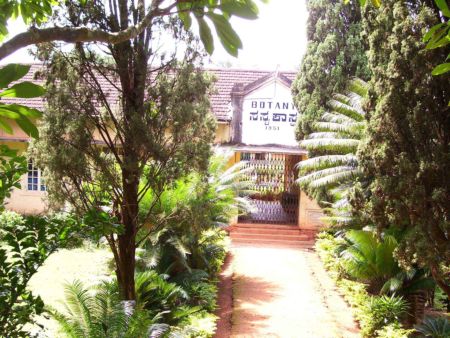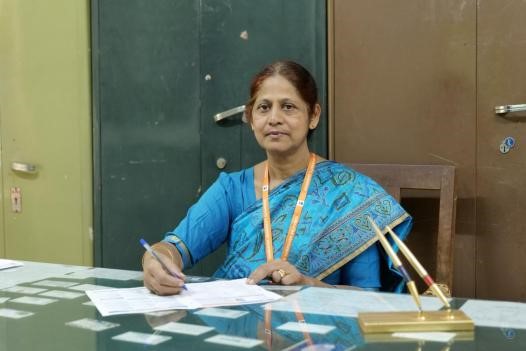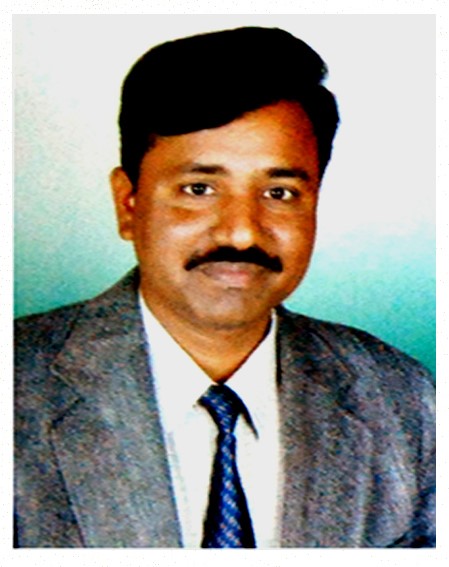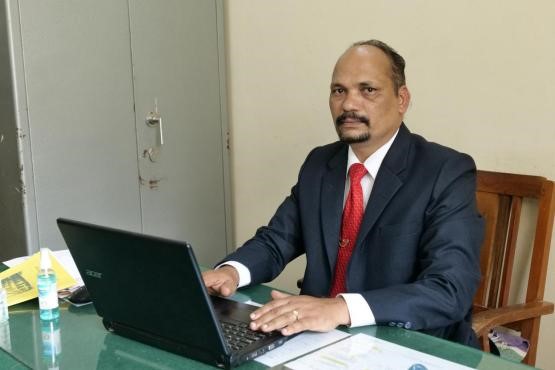The department of Botany is in the midst lush green vegetation providing a congenital environment for enhancing students studies. Earlier the department was housed in Biology building since 1937 and subsequently moved to its independent building in 1951. Biology was taught in main building (Arts Building).
The Botany subject was introduced at the subsidiary level of the graduate course in science. Prof. D.V. Shinde was the first to teach the B.Sc. Botany subject. Dr. L.K. Gunjikar joined him in 1937. Efforts of Prof. P.W. Gideon to introduce botany as a principle subject in 1938 was turned down by the Government of Bombay as the second world war had started.
Efforts were resumed in 1946 after the second world war and the Government gave the sanction to teach Botany as the principle subject in 1946, headed by Prof.(Mrs.) Elva Gonzalves in the independent building from 1951 to 1954. She was also the pioneer of phycology in this region. The credit for this tireless effort must go to wrangler Dr. D.C. Pavate the then Director of Public Instruction.
In 2000-01 looking into the needs of the students an applied subject Genetics was introduced. The course is run by the Coordinator who is a teaching faculty of Botany department.
The department has four laboratories, two labs for B.Sc, one lab for Genetics and the other lab for PUC course (which is shifted in New PUC block). There is only one classroom which can accommodate 60 students hence classes are also taken in Biology hall (Z1). There is one HOD room and five staff rooms and one preparation room. The most attractive part of the department is the garden which has about 2000 different plants both potted and grounded. The garden has almost all the plants for day to day practical use also a small medicinal garden has been developed.
The department has a herbarium housing more than 10000 specimens including Algae; in the herbarium a type specimen Isoetes dixtii Shinde (Italics) is an extinct species (Ex. 11352, Panchghani, Maharashtra) and other is Fischer Herbarium specimens from Holland. The department has four permanent teaching staff; Dr.(Mrs.) Doris M Singh, Dr. K. Kotresha, Dr. C.G. Patil and Dr. K.P. Kolkar. All are well qualified and experts in their field like Microbiology, Taxonomy, Genetics and Environmental Biology, Developmental Biology etc. Teachers are carrying out research work. All of them are Research guides. So far 16 students have been awarded Ph.D.; 18 students are perusing their Ph.D. and four major and four minor projects have been completed. There are 10 temporary teachers who are actively involved in teaching and Research.
The office is small having a computer operator (Smt. Surekha K.) and 3 peons (Shri M.B. Bachagundi, Shri Shrikant, Shri Praveen Madar) who look after all the labs both Genetics and Botany. Each day 4 labs run simultaneously a field collector (Mr. Angadi) and a gardener (Mr. Ramesh Chakrasali) are also part of the department. The department also has a lab assistant (Shri Kambi).
Dr. K. Kotresha takes up consultant activities of identifying the plants, students of Pharmachology Ayurveda regularly visit the department for identification for which a minimal fees of Rs. 100/- is charged. Teachers of various schools and colleges come to take plants from the Botany department for which they are charged Rs. 10/- per unit.
At present the total strength of the students is 293 at the U.G. level. The department has best practices; all teachers are mentors who conduct activities in developing the skill of the students while giving knowledge about the subject.
The Botany department also maintains a museum which has 7 sections comprising of Algae, Pteridophyte, Gymnosperms, Ecological instruments, economic botany, dried, fruits and fossil forms. Over all well being of the community is being taken care by imparting good education and conducting various programs like extension programs, development of nursery, production of organic manure, carbon sequestering, plant diversity documentation and keeping our environment clean.
DEPARTMENT OF GENETICS
Genetics Division in the Department of Botany, K.Sc.C.D
Genetics, a discipline of biology, is the science of heredity. This includes the study of genes, and the inheritance of variation and traits of living organisms. In the laboratory, genetics proceeds by mating carefully selected organisms, and analyzing their offspring. More informally, genetics is the study of how parents pass some of their characteristics to their children. It is an important part of biology, and gives the basic rules on which evolution acts.The fact that living things inherit traits from their parents has been known since prehistoric times, and used to improve crop plants and animals through selective breeding. However, the modern science of genetics seeks to understand the process of inheritance. This began with the work of Gregor Mendel in the mid-nineteenth century. Although he did not know the physical basis for heredity, Mendel observed that organisms inherit traits via discrete units of inheritance, which are now called genes.
The twentieth century began with the rediscovery of Mendel’s rules of inheritance and ended with the complete sequence of the human genome, one of the most monumental scientific accomplishments of all time. What lies in the future? What will the twenty-first century, the century of genomics, bring? Will geneticists a hundred years from now speak of a complete cure for cancer, heart disease, and mental illness? Will we have a cure for autoimmune diseases such as diabetes and arthritis? Will aging be slowed or even prevented? Will we have a complete understanding of the process of development and a concurrent elimination of birth defects and developmental problems? Will genetics put an end to world hunger? How will we live, and what will be the quality of our lives? The students who now are taking genetics will learn the answers to these questions as time progresses. Some students will contribute to the answers. The science of genetics includes the rules of inheritance in cells, individuals, and populations and the molecular mechanisms by which genes control the growth, development, and appearance of an organism. No area of biology can truly be appreciated or understood without an understanding of genetics because genes not only control cellular processes, they also determine the course of evolution. Genetic concepts provide the framework for the study of modern biology.An understanding of genetics is however crucial to advancements in medicine, agriculture, and many industries. Genetic controversies such as the pros and cons of the Human Genome Project, the potential ethical and medical risks of recombinant DNA and cloning of mammals, and human behavioral genetic issues such as the degree of inheritance of homosexuality, alcoholism, and intelligence. Genetics can help us to understand why people look the way they do and why some people are more prone to certain diseases than others. Genetics can help health-care professionals to identify certain conditions in babies before they are born using techniques such as prenatal testing. Genetics helps explain a lot of things, like what makes you unique, why you look like other members of your family, and why some diseases run in your family. Taking time to learn about genetics can help you understand your own health and make healthy choices. The subject comprises different aspects of living activities and their precise control through DNA, DNA mutation causing various diseases like cancer, congenital diseases, neuropathy and biochemical disorders like phenyl Ketonuria. The technical expertise of the students in the field of Genetics and Molecular Biology make the student employable.
In Karnatak Science College, GENETICS is taught as one of the optional subjects with Chemistry as the compulsory subject, and Botany or Zoology as the other optional subjects under three subjects of equal importance scheme. For academic and administrative purpose, genetics course is housed in Department of Botany. There is a dedicated laboratory for genetics with the state-of-the-art facilities to perform experiments in classical as well as molecular genetics. Separate group of teachers with expertise in the subject are appointed to teach the subject. Teachers are well trained in theoretical as well as practical aspects of genetics and are always available to the students in both online and offline mode. Students can consult the faculty members at any given time to clear their doubts. Alumni of the department with genetics optional subject are well placed in various National and International research organizations, working in various capacities in Government and non-Governmental organizations, indicating the contribution of the division in creating responsible citizens for the future. In order to nourish the academic zeal of the students, Karnatak University has started the Post-Graduation Department of Applied Genetics in the main campus, where the student can pursue his/her Post-Graduation and the Doctorate degree in genetics.












